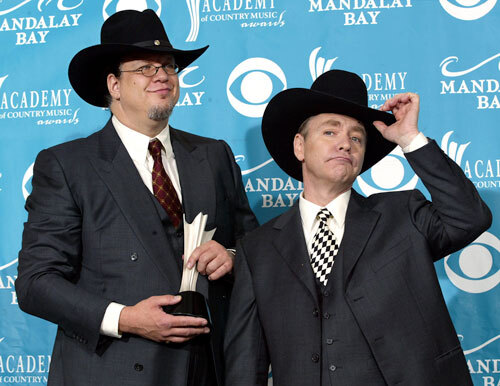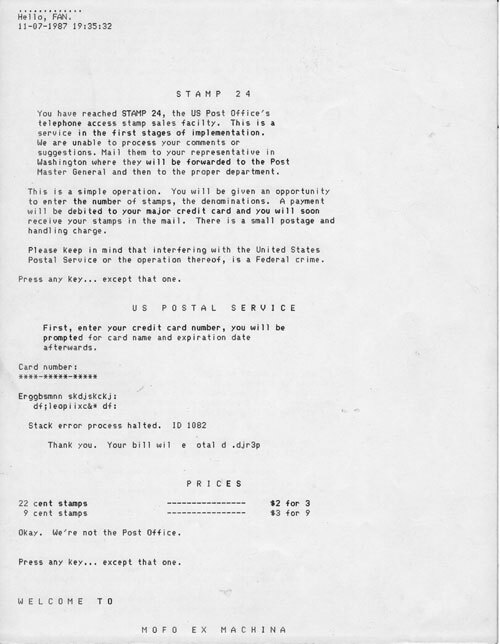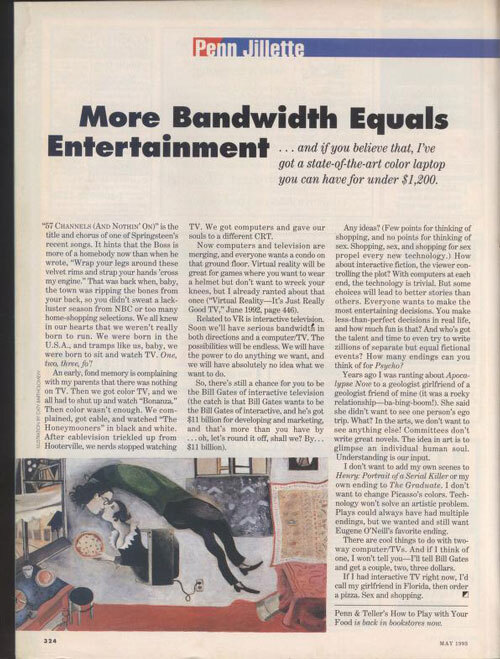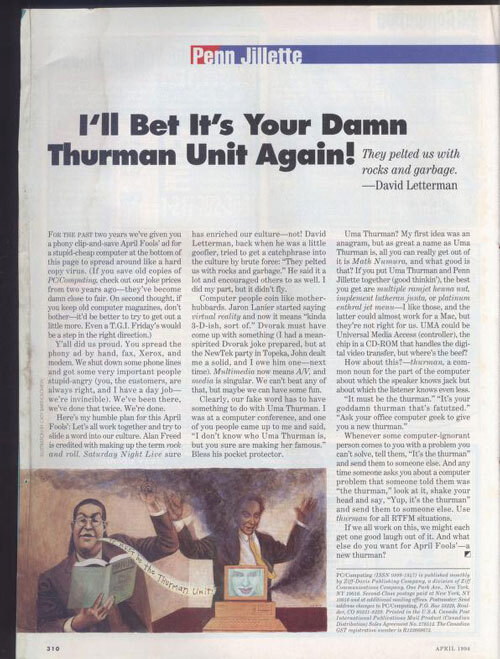Today in Tedium: Penn & Teller are fascinating figures, as celebrities go. Already hugely famous for their magic by the mid-1980s, their act—emphasizing a no-BS persona with a heavy focus on comedy, skepticism, audience subversion, and occasional libertarianism—remains electrifying to this day even though they’ve been working together in one form or another for more than 40 years. One of the less-discussed factors of their lasting appeal has been a willingness to create in multiple mediums, with Teller having been active in directing theatrical productions and Penn having a seemingly endless array of hobbies, some more unusual than others. One such hobby? He was, for a time, a computer magazine columnist—and a good one at that. Today’s Tedium talks about Penn Jillette’s unexpected period of being one of the most famous computer writers in the country. — Ernie @ Tedium
Today’s GIF is from the movie Hackers, in which Jillette has an acting role.

Why Penn Jillette kind of makes sense as a tech magazine’s back-page columnist
Penn Jillette, as a magazine columnist, strikes an interesting pose.
Clearly, it was never a top line item on his resume, and it took place when being a prominent tech journalist tended to have a smaller profile than it does today. But he still did well enough in the role that, for a time, he became one of the best-known editorial voices on technology in the country, one that only occasionally mentioned his day job.
Now, tech writing of this era doesn’t have the pedigree of, say, good music journalism in the 1970s. Certainly, there were good tech writers during this time, particularly free-wheeling voices like fellow moonlighter Jerry Pournelle of Byte, hard-nosed insiders like journeyman scribe John C. Dvorak and the long-anonymous Robert X. Cringely, and well-considered newspaper voices of reason like syndicated columnist Kim Komando and the Wall Street Journal’s Walt Mossberg.
But Jillette was something different. He was already famous—certainly more famous than Pournelle, an established science-fiction author, thanks to being a regular fixture on television during much of his career and starring in a legendary Run-DMC music video—and he likely did not need a nationally distributed computer magazine column to make a living. Jillette simply liked computers and knew a lot about them, which meant that he could rant about the details of an Autoexec.bat file just as easily as he can about politics. He gave the tech writing form something of an edge, while maintaining the freewheeling nature established by fellow pre-blogging voices like Pournelle.
Jillette took a plum role in the back pages of Ziff-Davis’ PC/Computing magazine around 1990, at a time when computers were on the cusp of going mainstream. The idea of putting the loud guy from a high-profile magic act was the brainchild of editor Paul Somerson, who had assembled a fairly strong lineup of writers at the magazine during the period, including Somerson himself, the ever-present Dvorak, and Gil Schwartz.
(Schwartz, by the way, has an interesting story of his own: He was a PR executive for Westinghouse who moonlighted as a magazine writer. While he used his given name for PC/Computing, he used a pen name elsewhere, which put him in an odd situation as he would sometimes use that pen name, a satirical business columnist named Stanley Bing, to anonymously criticize competitors of the television network that Westinghouse purchased, CBS. Schwarz later served as the CBS network’s head of corporate communications, and publicly admitted the use of the pen name around that time.)
Jillette got the back page, a fairly prominent spot for the period, and even in that environment, stood out as an irreverent voice, thanks to the fact knew as much about pop culture as he did about technology, as well as his already-prevalent libertarian streak, which many prominent figures in tech shared.

I can use this photo of Penn & Teller wearing cowboy hats, so I shall. (Rogelio A. Galaviz C./Flickr)
Tech magazines from the pre-internet era are often tough to get a hold of, and often require someone to care enough to scan hundreds of pages and distribute them in PDF format. Which is to say that not every issue of PC/Computing from Jillette’s time on the job is online, though many are, thanks to the Internet Archive, which also—quite fortunately—saved a full archive of Jillette’s old columns from Penn & Teller’s old website, SinCity.com.
(Teller is also a prolific writer, by the way, who—beyond his many books with Penn—also spent time writing for magazines such as The Atlantic and The New York Times Magazine. I at one point thought he had also done a column for a technology magazine, but he denies it. I do recommend looking up his writing, however.)
“Why am I the one who should review the new Teenage Mutant Ninja Turtles computer game? I’m 35 years old, I don’t have kids, I’m not a comic book collector and I have a favorite Teenage Mutant Ninja Turtle—that’s why.”
— The opening lines to Jillette’s review of a Teenage Mutant Ninja Turtles game, the first article he ended up writing for PC/Computing magazine in 1990. Very soon after, he would end up becoming a full-fledged columnist for the magazine.

It should be noted, by the way, that Penn & Teller were fairly adept with tech years before similar household names were active in the sphere. During the late 1980s and early 1990s, the duo ran Mofo Ex Machina, a bulletin board dedicated to their work in magic, which allowed them to share details of their work with their already fervent fanbase, but often screwed with those dialing in by initially hitting them with messages that made it seem like they were calling some official resource. Flickr user David Kha saved a printout from the BBS during that era—it’s pretty cool.

One of Penn’s PC Computing columns. (via Internet Archive)
So, what did computer columnist Penn Jillette write about?
On stage and on his various television shows, Jillette plays up the idea of being the loudest voice in the room, someone whose point of view the audience basically can’t avoid hearing, who serves a dual role as a court jester and know-it-all who has an opinion about everything. It’s a point of view that shines through in his PC/Computing columns.
One of his first columns for the magazine, written in 1990 under the name “The Micro Mephisto,” is surprisingly relevant today. Jillette made a case for taking your computer and making it your own by heavily customizing, or “trashing,” it. A passage from that column:
No matter how you got your computer, you will never sell it. Why the hell would you sell it? Six months after you bought it, it wasn’t worth spit. How the hell could you sell it, it would be easier to unload used 8-track and beta tapes. Whatever you got on your desk or lap right now—there’s a faster and sexier one with more memory and a better display featured right here in this magazine.
So, tell me this, why the hell is that thang still beige? And if it’s not beige, why the hell is it still tan? And if it’s sleek, high-tech black … well, we know they saw you coming. I’ll tell you why it’s that same boring factory color—because you’re a coward. You’re afraid if you mess with it—someone is going to yell at you. That’s just wrong thinking. No one’s going to yell at you because no one gives a good goddamn. Other people have their own problems. Have you seen these other people on the street? They’re all miserable, look at them. They don’t care about you or your computer. You could erase your entire hard disk including the unera utility, by mistake, while showing off for a cute babe and the people on the street wouldn’t even blink. They’re busy making their own stupid mistakes. And that gives you a great deal of freedom.
So here’s what I say and here’s what I do. Make that computer yours. Make it belong to you. Make it look right to you. Dominate it. Rule it. Violate it. Posses it. Trash the mother. I’m not going to tell you exactly what to do with it, I’ve already stuck my nose too far into your business. I don’t care if you put on backstage stickers to Lou Reed and the Red Hot Chili Peppers. You could peel the warning sticker off your 2 Live Crew CD and decoupage it right above the screen and change your prompt to
(C:\) Oh, me so horny>, put on scuba stickers and pretend you aren’t just a nerd like the rest of us. Or—be practical—no one can remember those WP commands so why not take a Sharpie and write “Just Kidding” right above the F1 key and “where the hell am I?” above F3. I haven’t tried a wood-burning tool or a soldering iron (they’re the same tool with different packaging, right?) But I bet it would look boss. Make it so if your computer was coming down the airline luggage carousel you wouldn’t have to look at the claim check number to tell it was yours. “Many computers do look alike”—and that’s a bad thing.
Jilette was very much an oddball as a back-page columnist, who carried a degree of hippie ethos in his writing—not that he was a hippie, but his irreverence stood out in much the same way.
And his perspective inevitably led him to write about things most tech columnists probably wouldn’t. Perhaps the best example is a piece titled “I Heart My Dog’s Head,” a reference to a controversy involving The New York Post, which implied, via one of its front pages, that there was “a secret anti-semitic message apparently urging death to Jews in New York City” hiding in Windows machines. The secret message? If you write in the font Wingdings, the letters “NYC” turn into a skull and crossbones, a Star of David, and a thumbs-up sign. Jillette, of course, thought it was a stupid controversy.
“Some brain dead, mouth-breathing, computer consultant (remaining nameless is probably the only smart thing this bottom-feeder did in his whole wretched life) was installing a program for a client, when he typed “NYC” while accidently [sic] in a clip art character set,” he wrote in his column.
(Years after Jillette wrote his column, the font controversy resurfaced around 9/11, leading to this Snopes article about it. Penn was ahead of his time.)
His role also led him to make irreverent predictions about where technology was going, leading to lines that were probably considered throwaway at the time but actually proved prescient, such as this thought about digital news:
To replace the newspaper, we have to make a CRT that can get folded up on the subway—there are people that will be able to do that. The hard part is taking the gigabytes of information available every hour—throwing most of it away and slanting the rest. People need to know when they’re finished reading and it needs a good solid slant so you have a good reason to throw your electronic newspaper across the damn room.
Jillette was passionate about the internet in its earliest form, particularly in its anything-goes form, which he heavily defended from a libertarian point of view. “We need as much peaceful anarchy as we can keep,” he wrote in September of 1994. “We can suffer bores, but we mustn’t tolerate cops limiting or invading what we send and receive on the Net.”

Uma Thurman came up in seemingly every one of Penn’s columns, which were mostly written before Pulp Fiction’s release. (Electrolux Appliances/Flickr)
In his column, frequent quirks would emerge: Jillette would make repeated references to actress Uma Thurman, who had yet to have her Pulp Fiction breakthrough, as well as to John C. Dvorak. He would occasionally be accused of not actually writing about computers. And he would occasionally do things that could cause headaches for his bosses, such as implying that users modify their Autoexec.bat on their laptops to simulate a bomb going off, a move that angered the FAA.
All in all, a pretty good column!
“Let’s face it, all of us PC/Computing readers could die simultaneously and we’d barely get a mention in Newsweek. I doubt Kurt Loder would even find out about it. So much for people snooping on us.”
— A perfect encapsulation of Jillette’s column, as printed in a 1991 issue. As it turns out, his column did earn a mention in Newsweek in 1992.

A 1993 fake ad that promoted an absurdly cheap computer. It was the second time Penn had pulled such a trick on his readers. (Internet Archive)
The time Penn Jillette trolled thousands of PC fans with an April Fool’s ad—twice
Jillette’s greatest editorial trick, however, came in April of 1992, with a column that combined basically everything that he was good at into an effective April Fool’s joke.
That month, he wrote a shorter-than-usual column in which he literally admitted that there was an April Fool’s joke on the page—a large, obvious one, but one designed to screw with people who read PC/Computing for the ads. See, Jillette’s column appeared in a section of the magazine in which there was a lot of computer advertising, and he took advantage of that by putting an ad on the page for “Thurman Computers,” which was selling a machine that had insane specs for the era, but pricing it at an absurdly low cost—a $20,000 computer for the heavily discounted price of $1,278.43. The ad had a phone number attached. When people called the number, the message was a voice berating them for falling for a scam.
It was clever. It was mean. It was something Penn Jillette would do.
And it drew a lot of controversy, including a mention in Newsweek, because the ad also fooled a lot of legitimate readers, not just those tricked by their tech-savvy friends.
The next year, Jillette wrote an “apology” for the prior year’s trick: “It got lots national press, most of it bad,” he wrote. ”It was an irresponsible, stupid joke.”
Of course, it didn’t help that the magazine did the same thing again, making it slightly more obvious that it was a fake ad.

By April of 1994, Jillette ditched the joke ad entirely and explained a little of the reasoning behind the fake ads, including the name, which he admitted was a yet another direct reference to Uma Thurman. Early in the column, he wrote this kiss-off to people who collect old computer magazines:
If you save old copies of PC Computing, check out our joke prices from 2 years ago—they’ve become damn close to fair. On second thought, if you keep old copies of computer magazines, don’t bother looking up my old column—it’d be better for you to start right now trying to get out a little more. Even a T.G.I. Fridays would be a step in the right direction. Learn a joke and don’t order egg salad.
He must have anticipated someone like me was going to write about his columns, even back then.
Jillette’s time as a tech columnist—and a successful one, at that—was all too brief, unfortunately.
By late 1994, Jillette wrote a bit of a kiss-off to both the column and his editors that criticized what the magazine had become—in part because he felt like the replacement squad was pushing him in a direction he didn’t want to go.
Another factor? He wanted to write about the ethical issues of the internet at a time when civil liberties issues were just starting to become important. PC/Computing wasn’t really the home for that kind of writing; Wired, which called Jillette “the most wired person in America” in a profile that year, was.
“Until I’m secure that we’re going to keep our cyber-freedom, I can’t bring myself to write about intuitive interfaces, or WP tips,” he wrote. ”Computers gave me hope for the simple pure freedom that I love about this country, and I can’t just watch it slip away.”
It was not a massive run—four full years of monthly columns in total—and it ended just as the internet was kicking off, which is probably why only Penn & Teller’s biggest fans might still remember the he had the back-page column in one of the most prominent computer magazines in the country.
But it was an interesting run, and one with few equivalents in publishing history—probably the closest comparison point is the regular column that Stephen King wrote about pop culture for Entertainment Weekly throughout the first decade of the 2000s. Most times, when celebrities are brought on to work with a magazine, they’re brought in as guest editors for a single issue—something Bill Gates, for example, did with Time just last year, and celebrities such as Michelle Obama and Taylor Swift have done for major magazines at different points, in what’s seen as a way to generate buzz.
Jillette, while keeping up a busy schedule of performances, television appearances, and writing (with Teller, he wrote Penn & Teller’s How to Play with Your Food during this period), still somehow managed to crank this article out every month, without nearly the level of prestige he might have gotten with a guest-editing gig somewhere. He did briefly write a similar column for the search engine and portal Excite in the late ’90s, but it had a smaller cultural impact compared to his PC/Computing column.
I know Penn’s a busy guy these days, but maybe he should start writing a column for The Verge or something.
--
Find this one an interesting read? Share it with a pal! And if you’re looking for a smart podcast, be sure to give Cheddar’s Need2Know a listen. Thanks!
Editor’s note: This story has been updated to reflect a response from Teller regarding whether he had also written a magazine column in the past.
from Hacker News https://ift.tt/2ms0KmG
No comments:
Post a Comment
Note: Only a member of this blog may post a comment.